Movie Reactions
Big Screens. Bold Opinions. Real Fans Sound Off on Every Hit and Miss.
Top Picks
Standout Reviews of the Films Everyone’s Talking About

Balle perdue 3
Director: Drama, Action, Thriller, Crime
Cast: Alban Lenoir, Steffi Selma, Nicolas Duvauchelle, Gérard Lanvin, Pascal Ebijo, Julie Tedesco
This is the final chapter of the series. Leno swears to find Alesky and confront him.
Read Full Review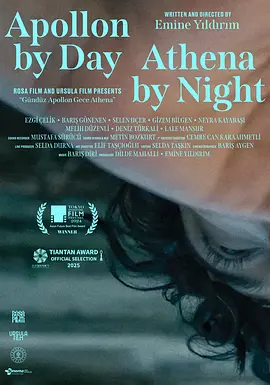
Gündüz Apollon Gece Athena
Defne travels to the ancient Mediterranean city of Side, where she meets a revolutionary, a prostitute, a priestess and other mysterious characters. Guided by them, she sets out to find the mother who abandoned her. This debut feature by promising female director Emine Yildirim is set in Side, an ancient Greek colony that was once a thriving port city near present-day Antalya. The two Greek deities in the title of the film Apollo by Day, Athena by Night are Apollo, the god of reason, and Athena, the goddess of wisdom, crafts and war. The film is a fantasy drama about women and men, the living and the dead.
Read Full Review
The Witcher: Sirens of The Deep
Hired to investigate a series of attacks on a seaside village, Geralt of Rivia is a mutant monster hunter who is thrust into the middle of a centuries-old conflict between humans and merpeople. Relying on the help of friends old and new, he must solve the mystery before the hostility between the two kingdoms escalates into all-out war.
Read Full ReviewAll Reviews
From Chart-Toppers to Cult Faves — See What Fans Are Saying

Balle perdue 3
Director: Drama, Action, Thriller, Crime
Cast: Alban Lenoir, Steffi Selma, Nicolas Duvauchelle, Gérard Lanvin, Pascal Ebijo, Julie Tedesco
User Rating: 6.7/10 (315 votes)
The 15-minute prologue uses two action scenes, namely a motorcycle racing scene and an indoor action scene, to set the tone for the whole film. It doesn't pay much attention to the plot. If you like the style of the first two parts, you will definitely like the third part, which magnifies the advantages of the first two parts. But if you think the first two parts are not good, then you won't like the third part either. The action scenes are much better than the first two parts. The city car chase scene must be borrowed from Mission Impossible. In the end, everyone gets on the plane and sets off fireworks. There is another short segment at the end. In fact, I think the plot is still interesting. It's not as bad as I imagined.
Read Full Review
Gündüz Apollon Gece Athena
Director: Drama, Comedy, Fantasy
Cast: Gizem Bilgen, Meli Duzenli, Baris Goneinen, Neira Kayabasi, Lal Mansur, Denis Turkali, Seren Uchail, Ezgi Celik
User Rating: 7.8/10 (944 votes)
In various movies from ancient times to the present, both in China and abroad, there are many stories that use the ghosts of the dead to conduct individual questioning, such as "Coco", which is based on the theme of family affection, "The Next Stop, Heaven", which uses individual memories to form a group image, and "The Sixth Sense", which uses horror to wrap up a warm core... "Apollo by Day, Athena by Night", a shortlisted film in the main competition unit of the "Temple of Heaven Award" at this year's Beijing International Film Festival, also spans thousands of years in this magical form. As the title suggests, this is a story full of mythology. In Greek mythology, Apollo is the god of light, prophecy, and disaster relief, while Athena is the god of wisdom and the patron saint of women. The two gods stand facing each other on the Mediterranean Sea, jointly guarding the small town of Side in Turkey. Psychic orphan Defne arrives here in search of her long-lost mother, accompanied by three souls from different eras: a Marxist revolutionary, a prostitute, and an ancient priestess. Delphine's journey to find her mother is also a journey for her and the three souls to break their obsessions. Delphine thought her mother had passed away, so she asked the souls that had been following her to help her find her mother's whereabouts, but she found that her mother lived a free and easy life and she was abandoned. The film does not portray this "atypical" mother as an object of public blame, but eliminates the social role of "mother" and allows women to return to their individuality. The reconciliation between Defen and her daughter is not achieved through the clichéd expression of debt and compensation. There is no imagined happy ending, nor too much resentment. The inheritance of the "psychic" ability has given their individual will a hint of divinity. From this moment on, Defen began to face up to her special mission and help the wandering souls fulfill their long-cherished wishes. The story of the ancient priestess is the most moving part of the film. She was burned to death for releasing a female slave in violation of the doctrine. She wandered in the historical relics of Side for thousands of years, and sent off her soul that no longer lingered in the world in the beautiful sunset unique to the Mediterranean, just like the incarnation of Athena. She forgot her own name and language, but was unwilling to become a person without words in history. She wanted all future generations to remember that there was a priestess who died for helping countless girls, and to remember her true fear and her ever-shining figure in that cruel history. "Apollo by Day, Athena by Night" is the feature film debut of Turkish director Emine Yildirim. It won the Best Film Award in the Asian Future Unit at the 37th Tokyo International Film Festival. Prior to this, Amina was already an outstanding screenwriter and producer, and her works have been nominated for many major international film festivals such as Busan, Berlin, and Cannes. She focuses on female narratives and intends to fight against the male perspective in this debut work. Although the film tells the unfinished stories of multiple souls and involves political issues such as the military coup and armed conflicts in Turkey in the 1980s, the overall tone is not heavy. It strikes a good balance between historical references, mythological metaphors, and realistic expressions. The mutual assistance and redemption of women across time and space makes the whole story particularly warm, and the portrayal of various mother-daughter/mother-son relationships is closer to life itself. Movie fans are welcome to watch "Apollo by Day, Athena by Night" during this Beijing International Film Festival. Cross the boundary between life and death in the soul ferry on the big screen and experience a special journey.
Read Full Review
The Witcher: Sirens of The Deep
Director: Drama, Action, Animation, Suspense, Fantasy, Adventure
Cast: Doug Cocker, Joey Batey, Anya Chalotra, Christina Ryan, Emily Carey, Camrus Johnson, Simon Templeman, Ray Chase / Mallory Johnson
User Rating: 6.0/10 (1341 votes)
the transition is also quite creative, the dubbing of the male and female protagonists is very good, and it is generally acceptable, but there are also many flaws.|It is a mystery what language the mermaids use to communicate. Sometimes they speak English, sometimes they speak mermaid language. The princess obviously knows English, but the prince still needs a translator. Could it be that these two people have been in love for so long and they have been "only making love and not talking"? Such a low-level mistake can only mean that the internal granularity is not aligned.|The positioning of the heroine is a bit awkward. She has become the protagonist inexplicably, and can even confront the prince privately. It feels that the only purpose of this role is to throw herself into his arms. The other content is just to make up for the length. In the end, she also helps to make up for the one-night stand. I guess Geralt is smiling.|I was stunned when I saw the siren suddenly singing. It was almost a clear reference to "The Little Mermaid", but the ending of this one is more in line with modern times, unlike traditional fairy tales.|The story of the Witcher series is known for "no absolute right and wrong", which will make the audience very painful but it is indeed thought-provoking, but this one is so-so, and the characters are more stereotyped, but I am still looking forward to the role of the skull barrel.
Read Full Review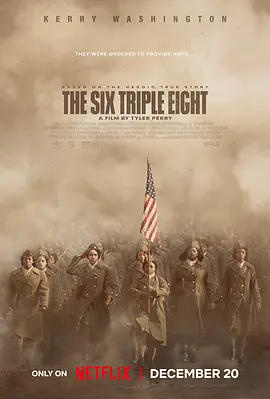
The Six Triple Eight
Director: Drama, History, War
Cast: Susan Sarandon, Kerry Washington, Dean Norris, Sam Watson, Oprah Winfrey, Sarah Jeffrey, Greg Sulkin, Milana Jackson...
User Rating: 6.6/10 (1104 votes)
The film is based on real people and real events. This is a big plus. People who experienced World War II are basically centenarians, and they will soon die out. Watch it and cherish it. Because it is a true story, there is no bragging, and love is a secondary issue. There is nothing too legendary. Death is death, and people die with a snap... A few highlights: Officers have the Women's Army Corps' Athena insignia. Soldiers have a different insignia. Before joining the army, women knew how to dress well. After joining the US Army in 1943 and the GI Bill passed in 1944, women soldiers were treated the same as men and did not have to go to the front lines, which was actually very good. But only those who were well-informed understood the significance of it. These people were well-educated, and there was no shortage of young ladies to gild their reputations. The transformation of the fat girl, especially the surprise at the end. It is not denied that Roosevelt wanted votes, the army wanted manpower, and the female soldiers wanted benefits. Previously, the treatment of the women's corps was very poor. After becoming a regular army, female soldiers are treated the same as male soldiers (including food, clothing, housing and transportation). Private soldiers can get an annual salary of $600, and skill badges can add several dollars, which is much higher than the average income of women of $525. The amount of food supplies is the same as that of male soldiers, so they are sure to have enough to eat. After retiring, the country can pay for college tuition. After World War II, many people went to college and made their own lives. In addition to traditional nurses, clerks, typists, switchboard operators, and initial positions, female soldiers will also be selected to participate in technical work, mechanics, drivers, ordnance and other departments, and even participate in the Manhattan Project. But most of the life-threatening situations are very limited. So if someone really died, it would be a big blow to morale. As for the black sisters, their abilities are definitely not trusted. But there is one advantage, because the Nazis discriminated against blacks, there must be no Nazis or spies mixed in... So they are very suitable for handling letters... It is understandable that they open letters privately. The movie itself is a formulaic military education film. The civilians are busy, determined to join the army, the boot camp is full of troubles and they have to quarrel with their comrades, then the rookies encounter difficulties in the first battle, and after education and a certain event, they are refreshed and grow into heroes. Finally, there is the epilogue. If you are lucky enough to listen to the veterans talk about World War II, they are basically fragments of obscure history. Most people are on low-intensity duty most of the time, just a job, and die randomly from diseases, bombings, accidents... (Those who continue to participate in high-intensity combat, even if they survive, will be affected both physically and mentally, and rarely live long. Soldiers usually march, dig trenches, and stand guard. When fighting, they just listen to the officers and fight. Some people don’t even know where they are. Although those in high positions have an insight into the overall situation, most of the time they are just doing map work, making phone calls, cursing, and looking for people to eat.) There must be some highlights in life. They become treasures in an ordinary and boring life. Many years later, you still often recall your college days or military service years... (then your life is quite boring). If you are lucky, there are many highlights, which are always your greatest treasures when you are tired or insulted. War is a manifestation of human stupidity. However, war forces the survival of the fittest, screens out the stupid and weak, and allows the brave and hardworking to gain more. So what? (The politically correct people who are now lying and taking bribes are nothing compared to these pioneers)
Read Full Review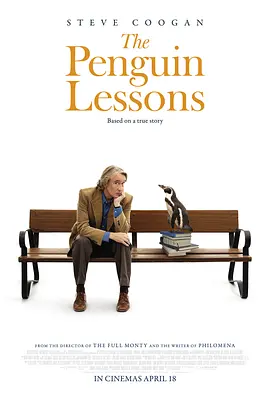
The Penguin Lessons
Director: Drama
Cast: Steve Coogan, Julia Forsey, Jonathan Pryce, Vivian El Jaber, David Herrero, Bjorn Gustafsson, Brendan McNamee
User Rating: 7.5/10 (532 votes)
In terms of form, it is Jean Reno's "My Penguin Friend" + "Dead Poets Society". The story is about the real events of the penguins superimposed on the horror background of the military government, and an artificial warm ending that British movies are good at. This makes people feel that the creative logic of this story is because they feel that the real penguin class story is too thin, so they try their best to add multiple meanings to the existence of penguins. In the end, the penguin became the link between the protagonist and everyone, the emotional food of the students, and the secret weapon to turn danger into safety. At the same time, it also has to bear the protagonist's allusion to his feelings in an unfamiliar environment. This responsibility is a bit too heavy. The film's allusion to the military government is also implicit, and it is not well compatible with the main line. The girl's return in the end is very dramatic, which makes the story have a strong fairy tale attribute. If some choices are appropriately abandoned, and the filming in Buenos Aires (the set of the film is too unsuccessful) may help the film perform better. But then again, the old lady and granddaughter line (although it may be purely fabricated to a large extent) is still delicate and makes people cry.
Read Full Review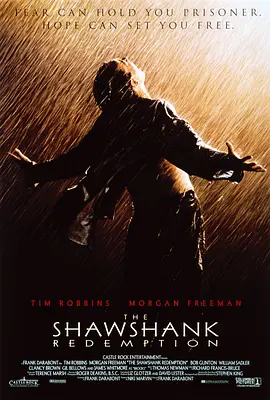
Cast & crew User reviews Trivia FAQ IMDbPro The Shawshank Redemption
Director: Epic, PeriodDrama, PrisonDrama, Drama
Cast: Tim Robbins, Morgan Freeman, Bob Gunton
User Rating: 5.0/10 (1000 votes)
At the Oscars that year, it was overshadowed by the towering presence of Forrest Gump, but over time, this film has surpassed Gump in the hearts of many. Whenever reality leaves me exhausted and powerless, I revisit this disc and reignite my dreams. Without a doubt, this film ranks among the top three must-watch movies for men! Recalling that iconic line: "Some birds’ feathers are too bright to be caged, even by the darkest prison."
Read Full Review
Kyuka: Before Summer's End
Director: Drama
Cast: Elsa Lekakou, Konstantinos Georgopoulos, Simeon Tsakiris, Elina Topalido, Stathis Apostolou
User Rating: 7.1/10 (948 votes)
The square frame cannot contain the overflowing blue waves at the end of summer in August and September. There are too many ambiguous backgrounds and too many vague words. Only the real emotions and silent blanks revealed by the words and interactions can make people resonate with them. The father, who is both a father and a mother, took his twin children on a sailboat to a beach where he often took them when they were young, and also went to see his ex-wife whom he had not seen for many years without the children's knowledge. God knows how excited and expectant he was on this day, but he still guarded his pride as always, arguing with her half-heartedly, and carefully handed over the USB flash drive he specially prepared with the children's video recordings. He wanted her to know how he had diligently raised the children during her absence. Although his ex-wife broke her promise after seeing him, he still invited her family to his boat by coincidence, and had dinner with the children - they ate the fish he caught with his superb fishing skills. Another fisherman, his ex-wife's husband, who was also good at fishing, exposed him and said that all the fish were bought from the market. His last sense of honor was punctured, and his broken marriage experience, the parent-child relationship that could not be honest with each other, and the fact that he could not catch any fish made him sink into the sea with his boat in vain. The only lifeless dead fish caught by his daughter on this trip was actually the fisherman himself. As for the close twin brother and sister (or sister and brother), except for a turtle of the same age as themselves, the memory of their mother has long disappeared. The mother is absent, the father is taciturn, the two are partners, laughing and playing, with a single-parent family history that is not worth mentioning behind them and a useless youth that knows nothing in front of them. They are the brownies that are bitten into the mouth and then spit into the sea in disgust, the broken shells picked up by a five-year-old girl on the beach, and the deflated rubber boat without a shore in the Saronic Bay in the western Aegean Sea. Although they had stopped asking about their mother's whereabouts, when they realized that the woman in front of them was her, they waded across the shallow sea and tried to climb ashore on the boat called mother. The younger sister finally gave the boat ticket to the older brother. She thought that this older brother who liked skirts and nail polish should be more liked by the mother who still had charm. On the last day of summer, with a bright moon hanging high in the sky over the Saronic Bay, one ship set sail and another was fished out.
Read Full Review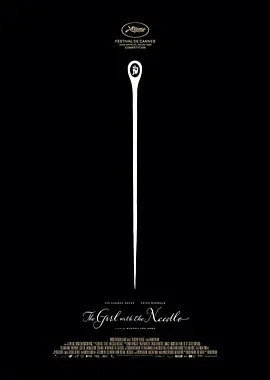
Pigen med nålen
Director: Drama, Thriller
Cast: Victoria Carmen Sonne, Trina Tihon, Bethel Zessili, Ava Knox Martin, Joachim Fjelstrup, Tessa Hoder, Søren Hitter-Larssen, Thomas Kirk
User Rating: 7.4/10 (4942 votes)
Originally named "Dogmar the Killer", Danish serial killer Dogmar Overby killed 9 to 25 illegitimate babies entrusted to her care around 1918 under the guise of a childcare worker. In the film, she was adapted into a candy store owner who helped those who could not raise their own children during the Great Depression of World War I to kill their babies. The director was not interested in retelling a biopic about a serial killer. The film shifted the narrative perspective to a victim (participant) mother in the Dogmar case, a weaver girl, the owner of the needle in the title, but that was not her production tool. The film transforms from a simple biographical film into a dark fairy tale about forgotten and abandoned people, depicting the Gothic appearance of Copenhagen at the end of World War I: widespread unemployment and scarcity, scarce job opportunities, people disfigured by the war who can only play monsters in the circus, abortion is regarded as a sin, pregnant women are expelled from factories, and many illegitimate children with no future try to find a ray of hope in the iron-clad ethical society. The film uses the method of horror films to outline the plight of women who have no future, no backup, and no escape options. Because of this, Dogma, who has been tempered by life and is also broken, but still has humanity, is a fatal attraction to Zhinu. For her, it is easier to dance with the devil than to love her husband torn apart by war or a weak young master across classes. An expressionist nightmare that reveals the devastating truth hidden behind the veil of civilization.
Read Full Review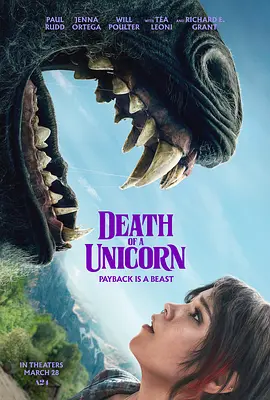
Death of a Unicorn
Director: Comedy, Horror
Cast: Jenna Ortega, Paul Rudd, Will Poulter, Téa Leoni, Richard E. Grant, Sunit Marni, Anthony Carrigan, Jessica Hynes, Steve Park, Nick Wittman
User Rating: 5.7/10 (1719 votes)
As mentioned before, the core setting of this movie is actually very interesting, and should have led to many exciting plots and creative ideas. However, I feel that the movie didn't really make use of this highlight. The overall feeling is a bit too conservative and too formulaic, which is a pity. Many plots are old hat, such as the tense father-daughter relationship and the extremely capitalist wealthy family, and the way these plots unfold lack novelty. From a visual perspective, the special effects of the unicorn are not particularly outstanding, but they have reached a qualified level. The presentation of the unicorn and the animation effects need to be improved, or more realistic alternatives need to be adopted and polished. A lot of times, it would have been better to simplify it, as many of the death scenes ended up being boring and predictable. The design itself is good and fits in with the overall style of the movie. The overall shooting level is also okay.
Read Full Review
Clown in a Cornfield
Director: Slasher Horror, Dark Comedy, Teen Horror, Horror
Cast: Katie Douglas, Aaron Abrams, Carson MacCormac
User Rating: 3.0/10 (100 votes)
Saw the opening voice-over: “I love men and the only thing better than one man is two men when they’re touching and kissing each other.”
Read Full Review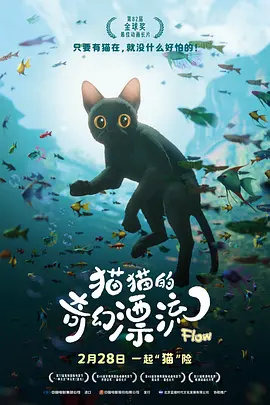
Straume
Director: Animation, Fantasy, Adventure
Cast: /
User Rating: 8.4/10 (125626 votes)
Flow is actually a very sad story. The aurora borealis appears in the tropics, floods come and go without a trace, survival is threatened at any time, and beloved things can be lost at any time. The galloping reindeer carries the message of the end of the world. In the cat's nightmare, it is an endless cycle, indicating that all life in the end of the world has nowhere to escape. The herd of deer roaring past again at the end is probably the precursor to the nightmare coming true. But why does this cartoon look cute, warm, and healing? Because the ignorance from the perspective of animals conceals the anxiety of survival in the end times. The black cat, Capybara, Labrador, lemur, and secretary vulture, these five animals carefully selected by the production team, do not have a predatory relationship with each other; except for the black cat and Capybara who are born to live alone, the other animals have either actively or passively left the group and lived in harmony on the "Noah's Ark", and even pulled each other and helped each other, which cast a layer of warmth on the end-of-the-world picture. And every time you stumble, you can always be caught by the kindness of other species, and every time you lose something, you will always get it back at an unexpected moment, as if nature also has some kind of mysterious warmth. Applying color on the background of sadness and despair, this is the unique healing power of romanticism. In this romantic drift, each animal pursues its own life agenda on the Ark. Their demands are intertwined, and each takes what it needs. The Ark becomes their small life community. Lemurs love the creations of human civilization. The magical transparent utensils (glass bottles), the hard and luminous regular devices (silver spoons), and the most fascinating magic that can show another self (mirrors) make lemurs crazy. The Ark is like a scale for lemurs. On one side are its treasures, and on the other side are life and death, and companions. It had two chances to return to its own tribe, but it gave up. Perhaps it realized that its own kind only love material things, and the alien companions on the Ark are the real belonging that can be pinned on. The secretary bird wanted to be in control. Because it insisted on carrying out its good intentions (protecting the cats), it fought with the leader, but was defeated, had its wings crippled, and was abandoned by the tribe. For the secretary bird, the Ark was like a power vacuum, and it naturally became the helmsman, the new temporary authority, and could act according to its own will. When the dogs boarded the ship, when things were beyond its control, it was the first to abandon the ship. Labrador longed for a master. The dogs that returned to the wild lost their allegiance and were fighting for their own survival, seemingly inheriting the dark side of both human and animal nature. Labrador's separation seemed to be due to the traces of domestication remaining in its body, and it tried to find the shadow of its master in the creatures of the Ark. It begged the secretary bird to play the parabolic game with it, imitated the movements of cats, wagged its tail, begged for food, and guarded everyone's sleep, and stayed with everyone until the last moment. Capibala is indeed selfless, it teaches everyone to give in to each other and live in peace, and there is nothing more important than eating and sleeping. In fact, Capibala is like the ark itself, and in the story it almost lives and dies with the ark - the first to board and the last to leave. Although cats are the absolute protagonists, their demands are the most ambiguous. If for lemurs, secretary birds and Labradors, the Ark is a place of belonging outside the tribe, and drifting is a practice of idealists, then for cats, what are the Ark and drifting? On the surface, the cat is the same as other creatures, except that it has never belonged to any group, so it just went through a process from being alone to having a partner, and finally ended up with everyone else, belonging to a sense of belonging alliance composed of different races. The film begins with the reflection of the cat in the water. This intention appears many times in the film. Before the danger comes and after the danger is gone, the cat looks at its reflection. Obviously, it is not Narcissus-like self-admiration, but it seems to have some loneliness and self-pity of a loner. At the end of the film, the reflection in the water is no longer a single person, but a family portrait. But if you think about it carefully, the bond between the cat and other animals is actually very limited before the final rescue scene. The role it plays on the ark is very unstable. When necessary, it will steer the rudder and catch food. When conflicts occur, it often even stays out of the event. So I tend to think that for cats, this drift is not only about finding a sense of belonging as a social animal, but also about seeking a sense of belonging as a solitary animal. Specifically, it comes down to the issue of human settings and religious symbols. Although the film does not explain the human part, we can judge from the ruins that human civilization has probably developed to the level of ancient Rome, with a venue that can accommodate thousands of people, a pillar like a holy mountain, and cat statues of various models around the human hut where the cats originally lived. Is it some kind of cat worship, or the owner of the house just likes cats very much? It is not even known what the relationship between the animals here and humans was, such as whether the dogs were domesticated dogs by humans, and whether the cats themselves were fed by the owner of the house. But it is obvious that humans have either become extinct or have evacuated the earth in a mysterious way similar to the collective disappearance on the holy mountain. Regarding religion, the most recognizable element is Noah's Ark. However, unlike the betrayal-faith, punishment-forgiveness, disaster-salvation, destruction-rebirth symbolized by Noah's Ark in the Bible, the Ark in this film is more like a temporary, even one-time place, a refuge for survival in the end of the world, and a private reserve for idealists who avoid materialism, barbarism and authoritarianism. Rather than calling it "Noah's Ark", it is better to say that these animals are all abandoned by Noah and left on the earth by humans to fend for themselves, so the animals themselves formed a small boat for self-rescue. It is spontaneous, temporary, and unstable. There is no punishment or blessing from God's will, but only the coldness and kindness from the unknown forces of nature; there is no promised land of hope, but some are signs of the next flood; of course, there is no Noah-like leader or organizer, but only a spontaneous alliance of animals. Of course, the Ark always symbolizes hope, but this hope is eventually destroyed. After the flood receded, the once hopeful Ark became a dangerous place and fell into the abyss before the next flood came. The second thing that can be detected is the divine implication of the secretary vulture. Since the secretary vulture took the helm, the Ark seemed to be heading purposefully towards the tallest building in sight, those towering mysterious pillars, or holy mountains. The holy mountain is a sacred image that appears in many religions. It is the abode of God and a place where one can communicate with God. In the end, the secretary vulture disappeared from the center of a mysterious formation on the holy mountain, but the cat fell back to the ground. God accepted the secretary vulture but not the cat, or the vulture found its ultimate home, but this did not constitute the ultimate home of the cat. Therefore, for the cat, humans and all possible bonds between humans and cats are not their destination. The gods guided by the secretary bird are not their destination either. The peace and love alliance between different races advocated by Capybara seems to be the destination given at the end of the film, but in fact it is unlikely to last forever. In this sense, the deeper sadness of the film is revealed under the apocalyptic atmosphere: the answer that the cat finally sees is that there is no destination. Even the mysterious kindness from nature is not a destination - the giant whale that saved them twice was finally stranded on the flat ground where the flood receded and was dying. The cat witnessed its death with his own eyes. The kindness between animals is so touching in the background of sadness. In the hint of despair, the family portrait reflected in the water, and the giant whale entering the waves under the sunset after the subtitles rolled, are the echoes of true romanticism. Of course, the cat in the film, as an animal, does not actually have the subjective consciousness of seeking self-meaning and ultimate destination, but the self-image that appears again and again in the water seems to imply the meaning of self-care, although this meaning is quite vague and ambiguous. This brings us to the biggest problem of this film - the improperly placed human perspective. No dialogue, no anthropomorphism, and a completely animal perspective are already very fresh innovations in today's world where Disney and Hollywood animations are dominant. In particular, there is no extra explanation of the whereabouts of humans, which is a very restrained and subtle treatment, which largely supports the credibility of the animal perspective. However, the animals in the film are far from real animals. Although they are not anthropomorphic in body, expression, movement and language, they do have both animality and human nature, and the animality among them is very human. For example, "dog nature" is equal to liking to play parabolic games, and "cat nature" is equal to liking to chase light spots. The "camera" in the film sometimes takes the subjective viewpoint of cats, but most of the time it follows the cats like an intelligent tracker, which is very much like the viewpoint of a natural photographer-the viewpoint of humans peeping at animals. Therefore, the whole film has a kind of embarrassment of wandering on the border of "animal world", "cute pet world" and "animal fable", not knowing where to land first, and the audience will feel confused between the sense of voyeurism and the sense of substitution accordingly. However, after all, the audience is all human, and the anthropocentric perspective problem between humans is probably easy to forgive. What's more, this is such a beautiful but not greasy, sad but not hurtful, simple but not simplistic cat adventure. Moreover, who doesn't love a doomsday healing road movie these days? Who hasn't been at the end of their own world? Who doesn't want the leap of faith they are forced to take to be caught by warm kindness? Who doesn't want an ark to accommodate their idealism? Therefore, since both the desire to voyeurism and the sense of immersion can be satisfied at the same time, as a viewer, there is no need to worry about anything.
Read Full Review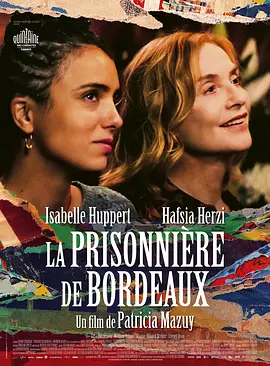
La prisonnière de Bordeaux
Director: Drama
Cast: Isabelle Huppert, Afsia Elch, Noor Elasri, Jean Guerre Souye, William Edimo, Magne-Håvard Brekke, Lionel Delrey
User Rating: 7.1/10 (2380 votes)
9.28 Pingyao The title is obvious. Even if the husbands are in prison, their ghosts (mixed with capitalist economy and patriarchy) still linger in the society where women live - the house. Men are prisoners in prison, and women are prisoners in the house. Therefore, the two women made completely different choices. The noblewoman fled with the artworks, allowing the artworks hanging in the villa to break free from the above discipline; while the poor returned to the prison to visit the prisoner with the spoils of parasitizing the rich, hoping to return to the patriarchal survival order. Although they seem to be completely different, they are actually the upgraded version of "Nora" with different paths to the same destination: artworks are not survival materials. The former may still starve to death if she escapes with artworks; while the latter is the successful begging version of Nora who returns and strengthens the poor family. On this basis, the lesbian elements and the betrayal in the bathroom make girls help girls, a humanistic theme that transcends class and race, generate more reflexive thinking, that is, sometimes people want respect and emotion or material compensation. If the latter is enough, then what is the so-called mutual help and confrontation, and how to do it? Therefore, leaving with the artwork is a metaphorical response to the question of "Nora": after material abundance, can we escape the old gender order, and how do we face the hesitation and meaning loss brought by the deeper new gender order in our hearts. It's like the paintings in those movies. When they are not trapped in the circulation of the art market and the homes of men, how will their value be reflected and where will they go. These movies don't seem to try to respond, but only use a slightly contrasting ending to summarize: the rich escape, the poor reunite. Such an ending does not cater to the current slogan-style network-style "feminist" theme in any sense, but allows this doctrine to self-transform and self-betray under a small ambition, thereby enhancing the overall perception of the movie, which is concise and pleasant. Therefore, it is understandable that its shots and stories are lackluster.
Read Full Review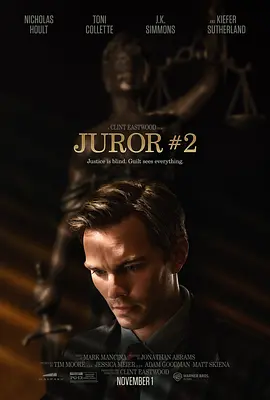
Juror #2
Director: Drama, Suspense, Thriller, Crime
Cast: Nicholas Hoult, Zoey Deutch, Megan Midgley, Toni Collette, Melanie Harrison, Adrienne C. Moore, Drew Scheider, Leslie Bibb, Heidi Nasser, Phil Biedron, Cedric Yarbrough, Bria Brimmer, J.K. Simmons
User Rating: 7.1/10 (11774 votes)
When everyone thought that in his last film, Toki, as the "beneficiary" of the current political context, was going to stage a smug right-wing victory settlement, he actually went the other way and provided some progressive reflections in "Juror No. 2": for example, in the jury, the field where identity politics can be set up the most, the two most "stubborn" defenders of traditional family values (to some extent representing ignorant and stubborn rednecks) are played by black people; and when the defendant uttered the classic scumbag confession "I'm not the guy anymore, I have changed" in the stand, what quickly flashed by was the silent sneer of the two female prosecutors who knew the truth - a typical female subject perspective. In fact, this unprecedented thinking is by no means a trick. As the jury debate deepens, the film seems to be following the classic path of "12 Angry Men" and its many variations (it's funny, the opening scene of the female prosecutor picking up the phone even perfectly pays tribute to He Bing picking up the documents at the end of "12 Citizens"), and the early exposure of the male protagonist's crime breaks this pattern - what Dong Mu tries to do is to put everything in a swaying state. The so-called "rigorousness" has become a prejudice, and the theme of "justice" throughout the film has unexpectedly become a stumbling block to revealing or covering up the truth. This ambiguity takes root and sprouts meticulously all the way until the last scene, when it suddenly changes its form. Through the gaze of the ending, the simple moral binary opposition in "Sully" or "Richard Jewell" is re-exposed. In Toki's values, there is and only one "correct" way of moral narration. On this level, "Juror No. 2" has never hesitated in morality or conscience. This is a firm conscience. For this reason, the skepticism about moral truth in "12 Angry Men" is actually opposed and even abandoned by this film. The last time this kind of complementary and inseparable justice and truth appeared in a concentrated manner seems to be traced back to Fritz Lang (and the day I watched the movie was his birthday). So everything ends with such a gaze that follows the moral values of the black film nearly a hundred years ago. There is no more perfect farewell than this. From the gaze, we see the adhered traditions, ancient ethics and principles, and the fate of this country - after all, don't forget the identity of the male protagonist, he is the most decent conservative white male protagonist in Dongmu's usual narrative, and his evil has been planted from the beginning. Just like the close-up of the scale that appears in the opening animation and runs through the whole film, the old man has completed an atypical patriotic reflection in this way that is consistent with and breaks the self.
Read Full Review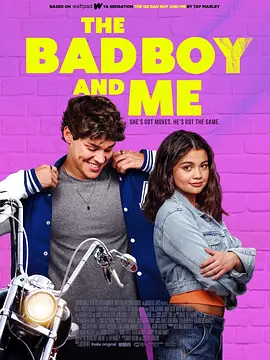
Sidelined: The QB and Me
Director: Drama, Romance
Cast: Noah Beck, Siena Agudong, Drew Ray Tanner
User Rating: 6.9/10 (421 votes)
In the interweaving of light and shadow, we see the diversity and complexity of life. Wonderful movies always touch people's hearts. Whether it is the ups and downs of the plot or the delicate portrayal of the characters, people are immersed in it. Movies are not only entertainment, but also an art. It brings us thinking and enlightenment with its unique perspective and expression. Every movie is like a dream, allowing us to temporarily escape from reality and enter a wonderful world. Good movies are worth savoring repeatedly, and new details and profound meanings can be discovered every time you watch them.
Read Full Review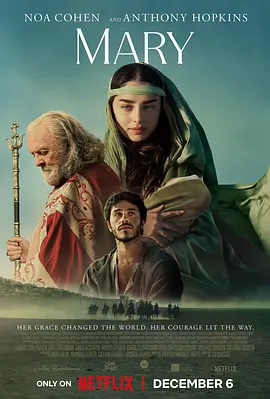
Mary
Director: Drama
Cast: Anthony Hopkins, Noah Cohen, Ido Tacco, Shila Vidor, Stephanie Noor, Gudmundur Thorvaldsson, Olli Pfeffer, Milo Djurovic, Mila Harris
User Rating: 6.0/10 (644 votes)
The costumes and props seem very delicate, but that's all. The core of the film's story is completely nonsense. The film's description of the sacred religion has neither the logic of God, nor the logic of man, nor the logic of history. The film simply and crudely caters to the legend without thinking about it, so that the characters have no growth, few deeds, and the suffering is false. It also seems to be whitewashing ancient Judaism. Although I don't believe in religion and only have a little understanding of religious history, I can see that this film is not sincere. Not only does it lack real religious content, but some of its content is contrary to its religious history. It is a product of political correctness from beginning to end.
Read Full Review
Dog Man
Director: Comedy, Action, Science Fiction, Animation, Family, Crime, Fantasy, Adventure
Cast: Peter Hastings, Pete Davidson, Lyu Bo, Lil Rel Howery, Isla Fisher, Billy Boyd, Ranuma Pansazi, Maggie Wheeler, Lunell Campbell...
User Rating: 7.1/10 (1103 votes)
Although it is a fan-oriented movie, it is very carefully produced. Not only is the painting style restored synchronously, but it also successfully presents many scenes and essences of the original comics, including the stories, lines and even backgrounds of multiple books that appear in the film. From time to time, the comic dialogues are directly drawn into the film across the dimensional wall, which is very creative. To be honest, Detective Dog is not easy to adapt. Although it is one of the most popular comic books among young elementary school students in the United States, teachers and parents have always had different opinions on it. But the director is very capable. He has achieved a smooth story line based on the collection of multiple stories. Some plots are even tear-jerking, and he grasps the three views in a simple and straightforward way: "We will be stupid and do bad things, but the kindness we release will eventually be treated gently by the world." It can be said that it is a rare popcorn movie for children that is easy, funny, positive and warm. Disadvantages: 1. Fan-oriented movie, pure American style, you may not get the fun and laughter of the story if you haven't read the original book. 2. It is suitable for children who still have a lot of strange ideas in their minds. Older children may find it childish/nonsense/inexplicable.
Read Full Review
April
Director: Drama
Cast: Yamze Sukitashvili, Kaka Kinzurashvili, Merab Ninidze, Roza Kancheishvili, Ana Nikolava, David Beradze, Sandro Kalandadze, Tosia Doloiani
User Rating: 6.7/10 (278 votes)
There are many straightforward birth shots; but the women in those shots are surrounded by doctors and illuminated by surgical lights. They lie on the operating table legally, but their bodies are still controlled. In the abortion scene before the rainstorm, the deaf-mute woman cannot yell. The nurse holds her hand. You can only see her body twisting and hear the sound of the cold instrument. About illegal abortion, about rape, about women's bodily autonomy, about medical conditions, about deaf-mute people... The director only shows the tip of the iceberg, but you can feel the iceberg buried underneath. In the end, the deaf-mute woman was killed, and the illegal abortion was exposed. The doctor accepted the questioning of his superiors. A bird hit the glass and died. I thought it would be fine if I was careful, but this is not true freedom.
Read Full Review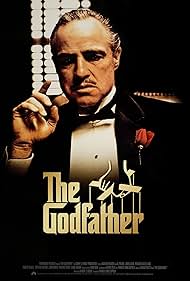
The Godfather
Director: Gangster, Epic, Tragedy, Crime, Drama
Cast: Marlon Brando, Al Pacino, James Caan
User Rating: 5.0/10 (2000 votes)
I love this movie and all of the GF movies. I see something new every time I have seen it (countless, truly). The story of tragedy and (little) comedy that exists in this film is easily understood by people all over the world. This film has been called an American story however I have met others who have seen this movie in other languages and they seem to have the same love and appreciation for it that I do. I love the characters and all of the different personalities that they represent not just in families but in society itself. It seems like the entire cast is part of every other movie that I love as well. The sounds, music, color and light in the film are just as much a part of the film as the people. This could be attributed to the method in which it was filmed. At many parts of the film I can still find myself feeling the emotions conveyed in the film. I never tire of appreciating this film. I thank God that FFC is an American treasure. We are fortunate to have him.
Read Full Review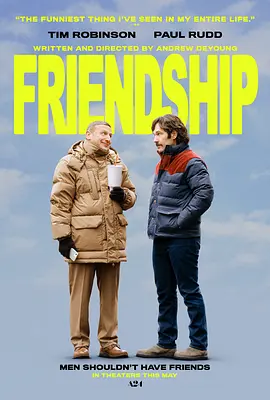
Friendship
Director: Comedy
Cast: Tim Robinson, Paul Rudd, Kate Mara
User Rating: 3.0/10 (100 votes)
Accepted too fast
Read Full Review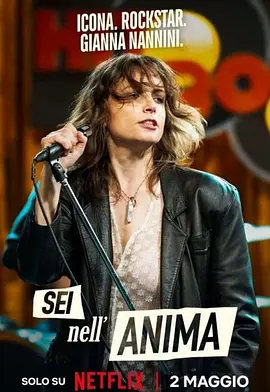
Sei nell'anima
Director: Drama, Music, Biography
Cast: Letizia Toni, Selene Caramazza, Maurizio Lombardi, Noemi Brando, Alessandro Cucca, Emanuele Luigi Cuomo
User Rating: 7.0/10 (273 votes)
The film uses powerful visual language to reveal the violent nature behind this beautiful ideology. On the surface, the film tells a coming-of-age story about youth, rebellion and self-identity; in essence, it quietly presents how beauty is constructed as a tool of social discipline and the painful struggles that individuals experience under this discipline.
Read Full Review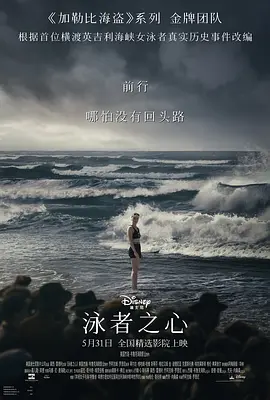
Young Woman and the Sea
Director: Drama, Biography, Sports
Cast: Daisy Ridley, Tilda Cobham-Hervey, Stephen Graham, Kim Bodnia, Janet Hine, Glenn Fleisher, Sian Clifford, Christopher Eccleston, Ethan Laws
User Rating: 9.0/10 (172561 votes)
The heroine is resolute and brave, with a rebellious spirit and fighting power; the heroine's mother is strong and neat, with the ability to take action and independent thinking. The world does not belong to men or women, but to innovators who are indomitable and have firm beliefs. But apart from the expression of feminism, although the script and conflict are rigorous, the film itself cannot be said to be outstanding. In addition to many similar problems of flat characters, there is another mistake that second-rate biographical sports films often make: focusing on the time nodes and process of the protagonist's achievements, while being stingy with her personal efforts during this period. And there are many confusing plots in it. In addition, it is strange that this very "Hollywood" style neat film structure has a more abrupt ending. After reading historical materials and biographies with doubts, I found many adaptations that caused incoherence, irrationality, and even very bad plots: 1. The heroine's family is not poor, but "very rich". For example, when the heroine was a child, her family had a beach house, and she once paid $1,000 to learn a new swimming style from a female swimmer she met by chance. 2. Compared with the mother, the father was more supportive of the sisters' swimming career at the beginning. It was the father who advocated sending her to the swimming association. The mother changed her attitude only after the heroine achieved results. 3. The ship explosion at the beginning did inspire someone to believe that "women should also learn to swim", but this person was Charlotte (a female coach). She founded the Women's Swimming Association in 1917. As soon as the association was established, it received strong support and donations from all walks of life. 4. The person who actually trained the heroine in swimming was Handley, a famous feminist in the swimming world at the time who advocated gender equality. He also improved the freestyle stroke to make it more suitable for women. 5. The U.S. Olympic Committee has never sponsored a female swimmer. The sponsor has always been the Women's Swimming Association. 6. Coach Wolfe had various conflicts with the heroine due to arrogance, gender bias, personality incompatibility, training methods, and scheduling. The relationship between the two was extremely bad, and Wolfe even sexually harassed her more than once. But there is no evidence that Wolfe drugged her. This plot occurred because the heroine's diet plan during training, including the energy replenishment arrangements during the training, was made by Wolfe, so Trudy had doubts afterwards, but the diet was made by Trudy's assistant, so Trudy and the Women's Swimming Association did not publicly accuse her. 7. Wolfe did not try to contact the heroine during the crossing. After the heroine felt extremely nauseous and wanted to vomit, Wolfe insisted on ending the crossing and directed others to rescue the heroine and get her on the boat. This was confirmed by the head of the female swimming association who was also on the boat. 8. Trudy's two Channel crossings were planned one year apart 9. Before the second crossing of the channel, it was the heroine's father, not the coach, who promised the heroine that he would never stop unless she gave up. 10. The heroine encountered a shallow beach 5 miles from the coast, but she never had the choice of "swimming across alone". Trudy had to either turn with the boat and cross the current or give up. Coach Burgess and the captain chose the latter for safety reasons, while her father and sister insisted on the former. Finally, after her father explained the situation, Trudy chose to continue. 11. At that time, sports were becoming more commercialized. Women's sports, including women's swimming, were in full swing, and swimming across the English Channel was just one of them. While Trudy was training, many male and female swimmers were also doing this training, all with the goal of becoming sports stars like the heroine. 12. Before Trudy started to cross the English Channel, her father and sister made a series of plans and designs for the commercial value she might create, including endorsements and a large number of commercial performances. After Trudy succeeded, they received a total of more than $1 million in business offers. 13. After Trudy successfully crossed the English Channel, she delayed her return to the United States and went on a commercial tour in Europe with her family, mainly visiting her hometown in Germany. 14. More than 20 days after Trudy successfully crossed the English Channel, the family returned to New York, and Trudy received a tsunami-like welcome. But the day after returning to the United States, Gad Cossen became the second female swimmer to successfully cross the English Channel, and then another male swimmer broke Trudy's time record.
Read Full Review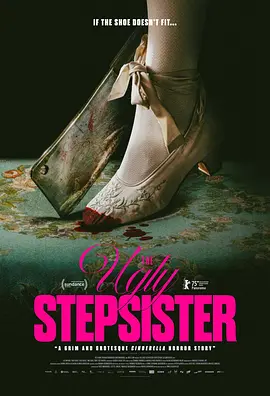
Den stygge stesøsteren
Director: Drama, Horror
Cast: Lea Myron, Thea Sophie Loch Ness, Anne Dahl Topp, Flo Fagley, lsaac Kalmros, Malte Goldinger, Raf Karlsson, Isaac Asperger, Albin Wildenblad...
User Rating: 7.2/10 (3769 votes)
The Ugly Stepsister (B+) This movie really disgusted me, but it is still worth watching! I received an early screening but missed it, so I finally made up for it. I am very glad. The Ugly Stepsister reinterprets the story of Cinderella from the perspective of the stepsister. Not only is the angle novel, the theme is more profound, and the method is bold, with no lack of direct blood and body horror. It is indeed an ancient version of The Substance, with a strong sense of irony. And this is also written and directed by a female screenwriter. I think only female directors can be so cruel to women. Nowadays, only female directors can torture women and satirize their perverted pursuit of beauty. Men really dare not shoot it, otherwise they will be scolded to death. Of course, female directors will never show the ugly faces of men in the film. The overall style of the film is very similar to "Something Substantial". Although fairy tales such as Cinderella and Snow White are for children and have many fantasy plots, they actually contain some dark and scary elements, which are designed to make children feel afraid and alert to bad guys. However, if these scary elements are magnified and the true human nature in the story is further demonstrated, it is definitely the best material for horror movies. Cinderella has the help of a fairy godmother, but how can she become beautiful without a fairy godmother? The Ugly Stepsister can only achieve this through plastic surgery, makeup, wigs and extreme weight loss, which are the "fairy godmothers" in reality. In fact, you already know from the trailer that there will be ancient plastic surgery and bloody scenes, but the film itself has more disgusting and torturous content. Even if you close your eyes and don't watch it, just hearing the screams of the heroine is terrifying. I can only say that if you are unlucky enough to see the scene, you don't have to eat dinner. It does have a weight loss effect. The ancient plastic surgery and weight loss plan in the film are astonishing. Compared with swallowing parasites to make yourself thinner, our current way of losing weight is really not extreme. But the wonderful thing is that even if you know that these cruel methods happened in the past, are exaggerated and unrealistic, people's persistent pursuit of beauty has not changed, but the methods have become gentler. There are still many people like the heroine who look ordinary but are extremely eager to marry into the upper class. For example, the socialite training class that everyone knows is the modern version of this movie. Some people still use all kinds of means to become beautiful and marry rich people or celebrities, from plastic surgery to learning how to seduce men. No matter how well you package it, it is still a scam, and behind it still exposes the ugly heart and perverted obsession with beauty and wealth. So even if the film is exaggerated, it is very realistic, and it is clear at a glance what kind of people it satirizes. The film no longer glorifies Cinderella, the prince, and everyone around them. Instead, it shows people that everyone is a slave to desire and is very selfish. Other people in this story are no better than The Ugly Stepsister. Cinderella is no longer a pure, kind, and unambitious virgin, but can't resist all kinds of temptations; the prince and the people around him are a group of perverts who are eyeing beautiful women, and evaluating women is basically like buying meat in the market. The mother of The Ugly Stepsister, Cinderella's stepmother, completely disregards her self-esteem and her daughter's life in order to please a man, and constantly tortures her daughter in various ways. The environment of all villains is more terrifying than the various bloody and disgusting scenes in the film. The Ugly Stepsister herself, the heroine, is not a simple and kind person, but a jealous paranoid. But she is indeed a girl who has been brainwashed by the utilitarian society and her mother. Under social pressure and the scrutiny of others, she has completely lost her self-awareness and self-pursuit. She only wants to be beautiful and marry a prince. She is so obsessed that she even cuts off her toes for this. If it is said that the foot binding of ancient Chinese beauties was an act of self-mutilation to please men, then cutting off oneself directly has reached a new level. But think about it, even if it is not cut with a knife, women are often very cruel to themselves. What is the purpose? In fact, there are always people who are more beautiful than themselves. If you keep "changing" and "disguising" yourself because of comparison and jealousy, you will eventually become a walking corpse that you don't even recognize. Even if people in modern life no longer need to compete with princes for a ball, there are still many people who compare and envy on social networks all day long and begin to feel ashamed. What I like about this film is that it really didn't make a big change to the original story, but just told more of The Ugly Stepsister. The main story of Cinderella was kept, and there was a grand ball. The protagonist changed from Cinderella to The Ugly Stepsister, which made people see the whole story from the perspective of the ugly duckling who wanted to become a white swan, which really made it more sad and cruel. The soundtrack was very good, and some of the music itself was screaming, which was very scary. Overall, I feel that some of the scenes are really unbearable to watch, but the story itself has a profound meaning and is very ironic, and it also vividly shows the mentality of some people who will do anything and even torture themselves in order to marry into the upper class. PS: At the end, the word "Slut" appeared on the big screen. I was shocked and thought the director was cursing, but later I found out that this word is the Swedish word for "The end". But it really hits the point. Once again, in this era, movies with connotations about women can only be made by women. It's ruthless and makes people applaud.
Read Full Review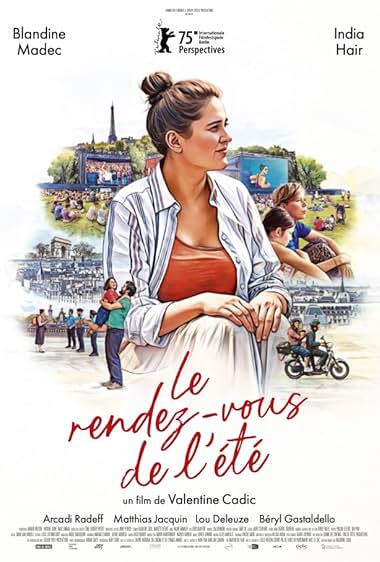
Le Rendez-vous de l'été
Director: Drama
Cast: Brandine Madec, India Haile, Arcadi Radef
User Rating: 3.0/10 (100 votes)
This year, the new artistic director of the Berlin International Film Festival, Tricia Tuttle, cancelled the previously acclaimed Encounters unit and replaced it with a new Perspectives unit. The new unit focuses on outstanding new filmmakers, especially those who have fluent and bold film language, compelling viewpoints, and new ways of looking at the world. French director and actor Valentin Kadic's debut feature film *Paris Summer* has become a highlight of this unit and the entire Berlin Film Festival this year. It has been repeatedly mentioned and favored in various film reviews of the Berlin Film Festival. In 2020, she co-founded Les Flimeuses, a production company dedicated to supporting female filmmakers. In the same year, she began her directing career. She collaborated again with Blondie Madyk, the star of her second short film *Summer Vacation*, and tailored this film between documentary and fiction for her, which is set against the backdrop of the Paris Olympics. The film was shot during the Paris Olympics, with the camera set up in the crowd, but it focused more on the private story of this queer woman. It is also a gentle interrogation of the issues behind the Paris Olympics, deftly piercing the theme park-like fantasy image of enthusiasm, diversity and inclusion that the Paris Olympics strives to present to the world. Most of the time, our protagonist Blondie cannot really fit in the carnival atmosphere of Paris. The film does not deliberately create any conflicts. We gradually deepen our understanding of Blondie as the film progresses, and learn the purpose of her trip: to watch the swimming competition of her favorite female athlete Beryl Gastaldello and to visit her half-sister Julie whom she has not seen for ten years. We also have a deeper understanding of her failed relationship and her choice not to have children. At the same time, we also experience Hong Sang-soo's embarrassing moments with her. Blondie is pure and introverted, and has a unique sense of pause, which allows her to stumble in various embarrassing situations. In such an Olympic moment with the most national significance, we can't see any unconscious attachment to nationalism in her. There is no such kitsch in the whole film, which is the freshness and cleverness of this film. She is more like a mirror, reflecting the doubts of the people behind the glamour of Paris who have never been exposed about the high cost of the city image project of managing the Seine River, and the questioning of the legitimacy of the act of expelling homeless people from the streets of Paris. Blondie continued to accumulate disappointment about this trip, and gradually got lost, until the day before she left Paris, she left sadly under the hysteria of her sister for no reason, and her Paris moment really came. She sat on the back seat of the motorcycle of her new friend, electrician Benjamin, and shuttled through Paris at night, bringing a gust of summer night breeze. The two fell asleep by the river, and when they woke up on the grass, Paris was shrouded in mist before dawn. A miracle happened at this moment. Beryl Gastaldello appeared on a bridge not far away with two dogs. It was a chance morning by the river, not in the Olympic stadium.
Read Full Review